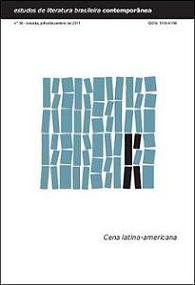O sujeito reconstruído:
sobre algumas imagens mallarmaicas na obra de Alejandra Pizarnik
DOI:
https://doi.org/10.1590/2316-40183812Abstract
A leitura da obra poética da argentina Alejandra Pizarnik revela ao leitor atento um emaranhado de imagens que remetem a um dos ícones da poesia moderna, o francês Stéphane Mallarmé. Entretanto, nota-se, ao mesmo tempo, uma radical mudança de comportamento do sujeito poético da autora, que em vez de desaparecer no teatro autorreferente do signifi cante ”“ como na obra mallarmaica ”“, infla-se e transforma o mundo externo em sua extensão. O que tal artigo sustenta é que esse movimento se dá em resposta ao enfraquecimento e à fragmentação que caracterizam o dito sujeito contemporâneo.
Downloads
References
BARTHES, Roland (1971). O grau zero da escritura. São Paulo: Cultrix, p. 53-72, 89-93.
BLANCHOT, Maurice (1984). O livro por vir. 13. ed. Lisboa: Relógio D´Água.
FRIEDRICH, Hugo (1978). Estrutura da lírica moderna. São Paulo: Duas Cidades.
HARVEY, David (1994). Condição pós-moderna: uma pesquisa sobre as origens da mudança cultural. 4. ed. São Paulo: Loyola.
HALL, Stuart (2004). A identidade cultural na pós-modernidade. 9. ed. Rio de Janeiro: DP&A.
LASCH, Christopher (1986). O mínimo eu: sobrevivência psíquica em tempos difíceis. São Paulo: Brasiliense.
KOREMBLIT, Bernardo Ezequiel (1991). Todas las que ella era: ensayo sobre Alejandra Pizarnik. Buenos Aires: Corregidor.
PIZARNIK, Alejandra (1994). Obras completas: poesía completa y prosa selecta. Buenos Aires: Corregidor.
TOURAINE, Alan (2002). Crítica da modernidade. 7. ed. Petrópolis: Vozes.
Downloads
Published
How to Cite
Issue
Section
License
Authors who publish in this journal agree to the following terms:
a) The authors maintain the copyright and grant the journal the right of first publication, the work being simultaneously licensed under the Creative Commons Attribution License-Non Commercial 4.0 which allows the sharing of the work with acknowledgment of the authorship of the work and publication this journal.
b) Authors are authorized to enter into additional contracts separately, for non-exclusive distribution of the version of the work published in this journal (eg publish in institutional repository or as a book chapter), with authorship recognition and publication in this journal.
c) Authors are allowed and encouraged to publish and distribute their work online (eg in institutional repositories or on their personal page) after the editorial process, as this can generate productive changes, as well as increase the impact and citation of published work (See The Effect of Free Access).
d) The authors of the approved works authorize the magazine to, after publication, transfer its content for reproduction in content crawlers, virtual libraries and the like.
e) The authors assume that the texts submitted to the publication are of their original creation, being fully responsible for their content in the event of possible opposition by third parties.


